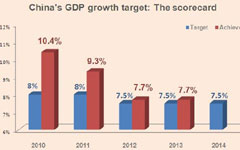Focus shifts from growth to quality
(China Daily) Updated: 2014-03-05 09:04Some say urbanization, which requires huge further infrastructure building, holds the key to China's continued growth for the next two decades. That may be true, but the flux of people to the cities still has to produce a return or else it will only serve to wrack up China's overall debt.
The problem for policymakers is that it is never clear what particular debt level might trigger an investment bust leading to a collapse of growth. It can be different between countries, with developed nations often better able to service high debt levels. High levels of debt in the US should not be a comfort.
|
 |
|
 |
Trigger points, often based on changes of sentiment, don't usually introduce themselves. Few foretold the current financial crisis even though many warning signs were there.
To remove the risk, the Chinese government has to rebalance the economy to one much more reliant on consumption than investment. Household consumption is currently just 35 percent of GDP, compared to 70 percent in the United States.
How to achieve such a change is far from clear. Many economists dismiss consumption-led growth as a concept since the ability to consume can only be derived from the success of an economy, but consumption, whether leading the economy or not, has to be achieved.
Measures such as better welfare provisions making people more confident about spending, as well as reform of hukou, or household registration, so that migrant workers can live normal lives with their families and, importantly, spend rather than remit money, are part of that equation.
The other vital area is financial reform, now on trial in the Shanghai Free Trade Zone.
China's private enterprises need access to finance. The economy cannot be reliant on State-owned enterprises that can afford to be inefficient by benefiting from cheap loans because Chinese savers get poor returns on their deposits.
This is why economic growth will no longer be the main priority or talking point as Chinese leaders discuss the future of the country.
|
 |
 |
- NHTSA says finds no 'defect trend' in Tesla Model S sedans
- WTO rare earth ruling is unfair
- Amway says 2014 China sales may grow 8%
- President Xi in Europe: Forging deals, boosting business
- CNOOC releases 2013 sustainability report
- Local production by Chery Jaguar Land Rover this year
- Car lovers test their need for speed in BMW Mission 3
- China stocks close mixed Monday

















